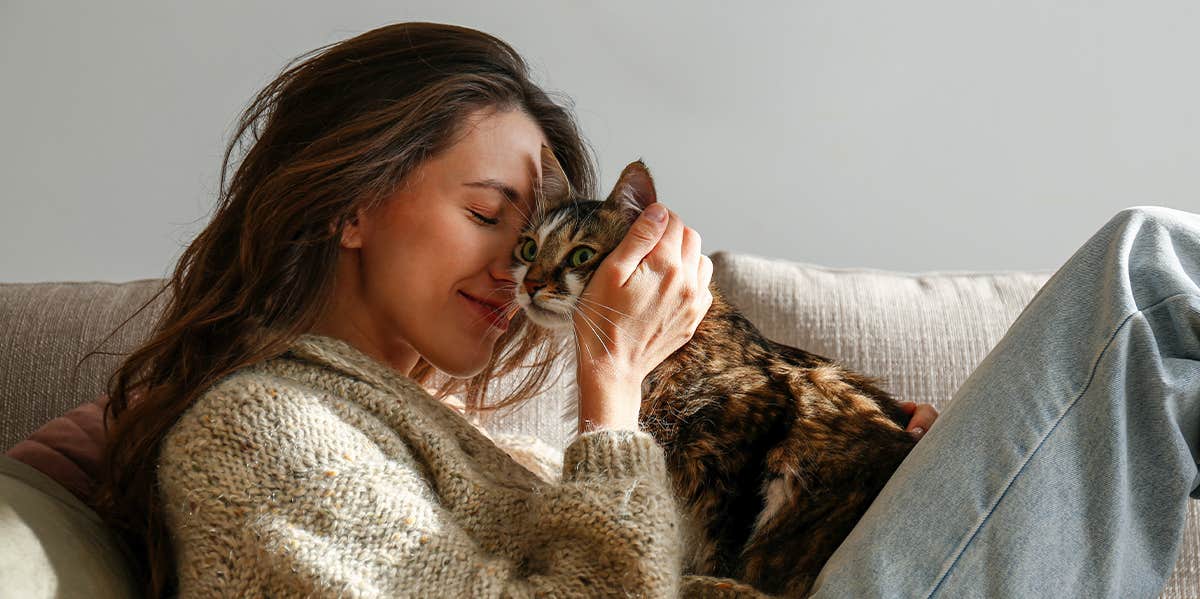What A Small Town Cat Taught Me About Emotional Entanglement With Unavailable People
Sometimes you just have to walk away.
 evrymmnt / Shutterstock
evrymmnt / Shutterstock “Dr. Levine, in his practice with clients and in his upcoming book, draws a similarity between gaining the trust of avoidant attachers and winning over outdoor cats: Leave the food out and they will come, he says.” —Melissa A. Fabello
It was a warm night, and I’d stopped to pet this cat in the small Delta town of Rio Vista. She’d been meandering up and down the sidewalk before plopping her cushy body against the concrete, where she settled into Croissant Position (one of my favorite cat poses). With the 1950s charm of the town’s main street as her backdrop, I snapped a few pictures.
A young woman seated on a bench a few feet away noticed me showing interest.
“Were you able to pet her?” she asked me as she lit a cigarette.
“Not really,” I responded. “She wouldn't let me get too close."
The girl then filled me in on this cat’s background.
She’d been a pregnant stray who’d started hanging around recently outside the restaurant that this woman worked at (which we were standing in front of). The girl and her co-workers fed her once a day. So did the people who worked at the bait shop across the street. The girl told me that after the cat gave birth, only one of her kittens had survived.
“She’s very skittish and paranoid,” she said. She paused before continuing on, “It’s really sad. But if you just sit there for a while she'll approach you.”
I followed the girl’s advice, sitting and turning my attention to my phone while pretending to have forgotten about the cat. From the corner of my eye, I saw her beginning to slowly inch toward me.
She carefully placed one paw in front of the other as she made her way closer. She'd take a few steps before stopping. Then she'd take another few steps and halt again. I maintained my focus on my phone.
We never did have our bonding moment. Just as I was about to hold out my hand for her to sniff, the cat skittered away. And even though she kept looking back thereafter, her scared and watchful eyes cued me to suppress the impulse to move closer.
It occurred to me, as I walked away, that we’d almost connected. She’d briefly entertained the possibility. She’d momentarily let down one slat of kitty wall guarding her kitty heart.
Ultimately, though, she kept those walls up. And I knew then that it wasn’t my place to stick around.
I’d wanted to prove my good intentions to her. I’d wanted to help her learn to trust in people again.
Maybe those wants, though— especially that last one— were just a little too lofty and unrealistic. Sanctimonious, even — because of course one person alone can't achieve that for another.
Not in five minutes, and not through a few head scratches and gentle coos. It takes a lot more than that. Maybe a lifetime of those repeated gestures (and sometimes, sadly, even that is not enough).
For many years of dating emotionally unavailable or conflicted people whom I wanted to fix or save, I viewed walking away as abandoning or giving up on the person.
I viewed it as giving up on my own desires, too— to experience enduring love.
I now see walking away as a compassionate choice for both myself and the other person, whose wounds I cannot heal, for that work is their own.
It took me a long time to accept that their recovery not only wasn’t my responsibility but was also not my business (unless they explicitly asked for me to make it mine).
Maybe the cat in Rio Vista and people like her see “fixers’” attempts as akin to waving band-aids— insistently, pesteringly, pitifully, and naively in the face of deeper gaping wounds.
This gesture is not only ineffective but maybe even… annoying. Perhaps it even worsens the pain for them, because now the original hurt accompanies the additional pain of feeling unseen.
So I left that night, with a heart slightly heavier than it had been before.
I carried with me to the car the reminder that some wounds are beyond any one human’s capacity to heal, and that sometimes the only action we can take to prevent them from deepening is to disengage and accept that which we cannot change; that which only time and another’s own efforts can mend.
Eleni Stephanides is a LGBTQ bilingual writer and Spanish medical interpreter. Her work has been published in Them, Tiny Buddha, The Mighty, Uncomfortable Revolution, Breath and Shadow, Elephant Journal, The Gay and Lesbian Review, and Introvert Dear among others. Follow her on Instagram.

